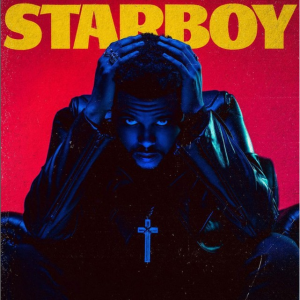In the music video for “Blinding Lights,” The Weeknd, born Abel Tesfaye, dances maniacally through the empty nighttime streets of Las Vegas. Bandaged and bloodied, he sports a red suit reminiscent of the Joker, laughing deeply at nothing and nobody in particular. The unsettling video serves as an introduction to the dark themes throughout After Hours (2020), The Weeknd’s fourth studio album. Dynamic in sound yet consistent in quality, the release sees Tesfaye building on his distinctive R&B sound and blurring the line between himself and his maniacal alter-ego.
Tesfaye’s lyrics have long embraced a low-life persona, focusing heavily on drug use, infidelity, and the pitfalls of fame. Each track on After Hours is either a high or a heartbreak, and neither is particularly uplifting.
The album’s production quality is apparent from the first seconds of its introductory track. “Alone Again” features arpeggiated synths coupled with a foreboding bass line. “Take off my disguise,” sings Tesfaye. “I’m living someone else’s life.” This singer-character dissonance pervades the album, as The Weeknd plays the role of an unreliable narrator for Tesfaye’s lived experience.
On certain songs, the real-life inspiration for the music is far more visible. In “Scared to Live,” Tesfaye delivers a downtempo ballad lamenting romantic loss. The minimal instrumental backing allows his falsetto vocals to shine, but the lyrical content on this track is not particularly introspective or innovative, focusing entirely on an unnamed former love interest. The Toronto-based artist’s life has certainly changed since his last album, Starboy (2016), following a well-publicized breakup with Selena Gomez and an off-and-on relationship with Bella Hadid. If Tesfaye chooses to sing about heartbreak, his fans deserve to hear how these experiences have changed him. This track differs little from the content of his previous work and thus provides no insight into the man behind the microphone.
Later on in the album, however, Tesfaye proves that he is capable of escaping his own lyrical clichés. “Snowchild” showcases his ability to channel emotional depth as he reflects on his fame and personal development. “Cali was the mission, but now a n— leaving,” he sings, firmly rejecting Hollywood’s opulence and excess. This jaded-from-stardom theme is far from unique to Tesfaye’s work (see Kanye West and Kendrick Lamar’s “No More Parties in LA” for another example) but for him, it represents a new level of blasé.
Afters Hours peaks on the three-song run of “Heartless,” “Faith,” and “Blinding Lights.” Metro Boomin, who has quickly become hip-hop’s leading producer, crafted the beat for “Heartless,” the lead single off After Hours. The track begins with atmospheric keys before coalescing into deep bass and profoundly self-loathing lyrics. “Low-life for life ‘cause I’m heartless,” sings Tesfaye, rejecting any early hints that he has matured past his old lifestyle.
“Faith” also features production from Metro, whose pulsating synths build tension for the first 90 seconds of the song. Just as the beat drops, Tesfaye breaks in with a quintessentially Weeknd line. “If I OD,” he sings in falsetto, “I want you to follow right behind me / I want you to hold me while I’m smiling / While I’m dying.” It’s an incredibly grim image, one that portrays a defeated acceptance of addiction.
“Blinding Lights” is the largest commercial hit off the album, as it’s been seemingly inescapable on the radio for the last four months. With a distinctively ’80s-esque beat, evocative of a-ha’s “Take on Me,” the track seems ideal for late-night joyrides or walks through the city (although, in the near future, I wouldn’t recommend partaking in either of those).
On the title track, Tesfaye delivers a penultimate musical punch. The almost-unheard-of six minute pop single, “After Hours” spends two minutes teasing the listener with minimal instrumentation before coming to a rewarding crescendo. “Baby, where are you now that I need you most?” asks Tesfaye. With deeply emotional vocals, the listener can’t help but feel somewhat sorry for the narrator, despite the fact that he confesses to infidelity on nearly every song leading up to this.
At the end of the 65-minute musical rollercoaster ride lies “Until I Bleed Out,” a sonic contrast to the uptempo tracks that precede it. It is rare, especially in modern music, that an artist can cram a turn-up track and a breakdown song on the same album, but Tesfaye fits multiple categories. After all the calamity on the album, the release ends on a peaceful, albeit somber, note. “I don’t wanna touch the sky no more,” he sings. “I just wanna feel the ground when I’m coming down.”
After Hours is sonically impressive throughout, but its commercial success is also partially ascribed to its enormous marketing budget. It is the album equivalent of a major studio blockbuster, but with only one A-list star: The standard edition of the release has no featured artists. Tesfaye has long been building expectations for his fourth studio album, beginning with a hypnotic appearance on the Late Show with Stephen Colbert. In the clip, he rejects the stage, instead venturing underneath the studio and dancing through a labyrinth of spinning hallways.
The visual element of After Hours, starting with the Colbert appearance, has been almost as impressive as the musical content itself. In accordance with a Billboard rule change, Youtube views now count towards the top album charts, and labels have responded by placing more emphasis on producing high quality music videos. Still, directors have not shied away from the dark nature of the album: For “In Your Eyes,” a bloodied Tesfaye finds himself chasing after a woman in a club, before she decapitates him and dances with his severed head. That he can make videos this graphic and still appeal to a mass audience (he is, after all, the #1 artist in the world on Spotify) speaks to the allure of his mysterious character.
Though the album was written long before the current crisis, it feels especially poignant now in its themes of isolation and personal calamity. With decidedly solipsistic lyrics, Tesfaye seems to have embraced solitude long before it became socially mandated. After Hours deviates from reality at every turn, and in an era where the real world is increasingly dystopian, escapism is exactly what we need.
VOICE’S CHOICES: “Snowchild,” “Faith,” “Blinding Lights”







[…] Source link […]